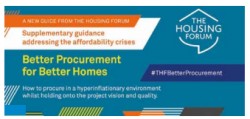The Housing Forum has published a new supplementary guide that offers advice on how to procure in a ‘hyperinflationary’ environment and will be of interest to all home developers.
With inflation now at a 40 year high of 11.1%, fuelled by rising energy costs and global supply chain difficulties, it has created an extremely tough landscape for procuring construction work, threatening the prospects for new housing development.
The Autumn statement offered little by way of help for the housing sector facing rising costs and an uncertain market. Last year The Housing Forum published the Better Procurement for Better Homes Guide. They have now published ‘Better Procurement for Better Homes Supplementary Guidance’ to help the sector to cope with these new inflationary challenges The key audience for the new supplementary guidance is local authorities and housing associations who are seeking to procure new homes in the current economic climate.
The guide may also be of interest to developers, contractors and consultants looking to work in partnership to develop housing or tendering for work, and to policy makers and regulators who need to understand the challenges facing social housing developers bidding for funding. Key messages from the guidance include the importance to build trust and work with contractors who share values of commitment to quality, are willing to work in an open book environment and demonstrate a collaborative approach reduces risk.
It is also critical to closely involve the finance and procurement teams – whole-team decision making needs to be a dynamic process, with budget holders updated and alerted as soon as inflation looks to be adding cost pressures that threaten to breach contingencies. Managing risks equitably between commissioner and contractor and acknowledging that some sort of price fluctuation (both up and down) will have to be accommodated over long contracts is recommended alongside the age old need to engage early with the contractor’s supply chain and enabling quicker on decision making.
When appointing the contractor/ supply chain, the supplementary guidance points out: “The main principles set out in Better Procurement for Better Homes of appointing main contractors and the supply chain early are even more critical in a hyperinflationary market. Appointing the contractor at the earliest opportunity (potentially at the pre-planning stage) under a flexible partnering contract, or using a PCSA, is vital to manage design and risk and optimise use of Modern Methods of Construction (MMC).
Clients can aim to reduce the time from appointment to start on-site by appointing contractors from frameworks. “Firms on these frameworks will have already been cleared against certain criteria – and clients can take comfort that these firms will have had to have demonstrated, amongst other things, financial probity and a good health and safety record.
As in our original guide, bringing the supply chain in early also remains a high aspiration, but this is likely to prove difficult in the current landscape, and the process of bringing on board suppliers is likely to be spread out for a much longer period.” Matthew Goulcher, Managing Director of Levitt Bernstein and Chair of the Housing Forum Working Group which produced Better Procurement for Better Homes as well as the new supplementary guidance said: “The 40-year-high inflation rate, fuelled by rising energy costs and global supply chain difficulties, has resulted in an extremely tough landscape for procuring construction work, as contractors and their specialists become reluctant to commit to fixed prices too far in advance of work starting.
This has profound implications for clients trying to plan and budget for work. Our new guidance will help steer through these obstacles.” Shelagh Grant Chief Executive of The Housing Forum added: “Our new supplementary guide, which is based on the vast practical knowledge and experience of The Housing Forum’s extensive membership, will prove a tremendous boon to housing associations, councils and commissioners who may be considering pausing developments in these challenging times.”
Read the full article, go to Offsite Magazine









